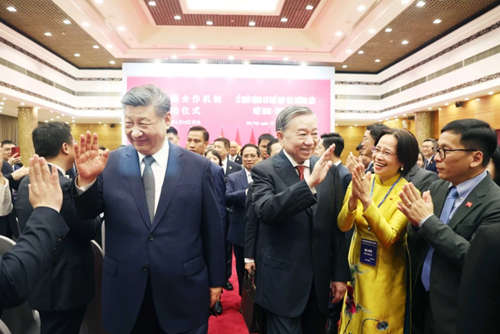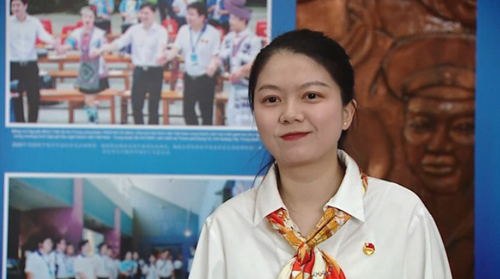This year, to mark the 75th anniversary of the establishment of bilateral diplomatic relations (January 18, 1950 - 2025), the two Parties and States agreed to designate it as the Year of Vietnam-China Humanistic Exchange.
On this occasion, General Secretary of the Communist Party of China and Chinese President Xi Jinping announced for the first time that China will invite Vietnamese youth to participate in the "Red Study Tours" over the next three years, with the aim of helping the young generation of both countries better understand revolutionary values, respect neighborly friendship, and strengthen mutual bonds.
    |
 |
|
Party General Secretary To Lam (third from right) and Party General Secretary and President Xi Jinping (left) and other high-ranking leaders attend the Vietnam-China Youth Friendship Meeting in April |
Vietnam through the eyes of Chinese youth
During her first visit to Vietnam to attend the Vietnam-China Youth Friendship Meeting in April, Huang Chenshen from the China Youth University for Political Studies had many profound experiences in Vietnam.
She listened to speeches by Chinese Party General Secretary Xi Jinping and Vietnamese Party General Secretary To Lam, visited Quang Ninh and Ninh Binh provinces, and explored the local culture. What impressed her most was experiencing the cultural life of ethnic minority communities through performances of folk songs and traditional musical instruments. She expressed her deep empathy and inspiration of Vietnam’s efforts to value and preserve its national identity.
Vietnam places great importance on preserving and promoting the cultures of its ethnic minority groups, which is not only reflected in artistic activities but also embedded in development policies. That, she shared, is something she deeply admires, and it has been a great source of inspiration for her.
Red Study Tour – Connecting memories, nurturing ideals
The “Red Study Tour” program was proposed by Xi during his visit to Vietnam in April.
The program links together historical sites associated with President Ho Chi Minh and former Chinese leaders, serving as a “living history classroom” that fosters a spirit of solidarity and a shared sense of responsibility among young people for peace and development.
    |
 |
|
Huang Chenshen from the China Youth University for Political Studies (Photo courtesy of Huang Chenshen) |
Nguyen Thi Phuong Hoa, former Deputy Director of the Institute for Chinese Studies and Deputy Editor-in-Chief of the Chinese Studies Journal, commented that the “Red Study Tour” is a clear testament to a new phase of development in youth cooperation between the two countries.
She assessed that the content of youth exchanges has become increasingly diverse, shifting from general forums to more practical, thematic discussions closely tied to the role of young people in national development and innovation.
On May 18, the first event in the “Red Study Tour” series, organized by China’s Guangxi province under the theme “Following President Ho Chi Minh’s Footsteps”, attracted a large number of Vietnamese youth participants.
Huang Chenshen highly appreciated the program’s role in fostering connections, considering it a valuable opportunity for the younger generations of both countries to gain a deeper understanding of the historically close revolutionary relationship between Vietnam and China.
Hoang Thi Bich Diep, Deputy Secretary of the Youth Union at the Lang Son College of Education, said: “We’ve learned about President Ho Chi Minh from primary to high school, but most of our knowledge about his time in China has come from biographies. This is the first time I’ve had a deeper understanding of his revolutionary activities there.”
In addition to the journey to historical sites, Guangxi also organized activities for youth to experience artificial intelligence technology and the digital environment - essential elements of the modern era. Vietnamese participants had an opportunity to visit a robotics lab, experience high-speed train, and explore advanced technological applications.
According to Huang, "red" culture is a precious historical memory, but today’s younger generation must also look toward the future. She stressed the need to not only preserve the memory of the revolution, but also clearly recognize the role in the process of modernization.
Source: VNA